COASTAL Biogas flyer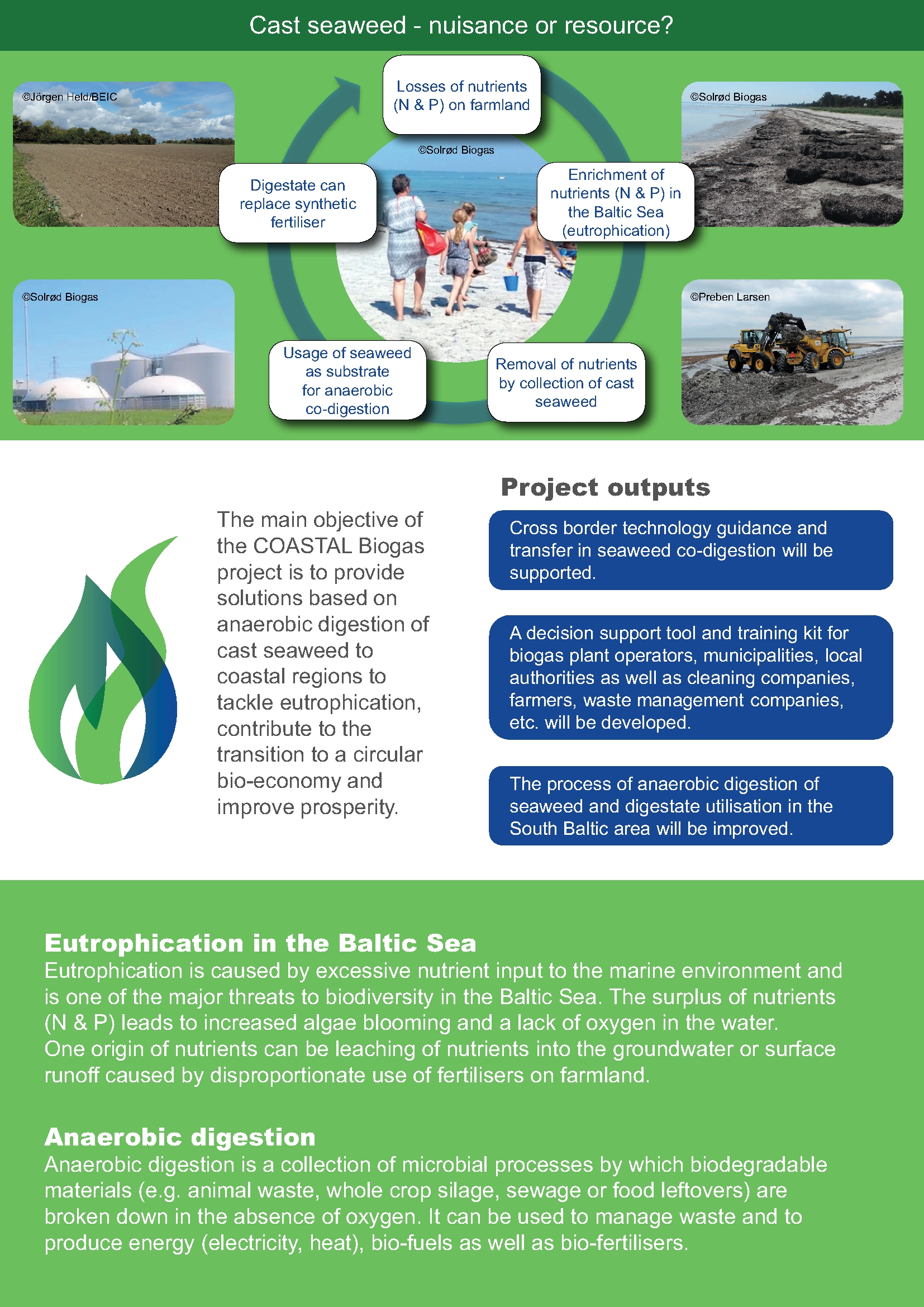
The six page COASTAL Biogas flyer gives a brief description of the project including objective and outputs. If you print it, please note that the flyer should be folded as an envelope (otherwise the text will be upside-down on one of the pages).
Poster Greifswald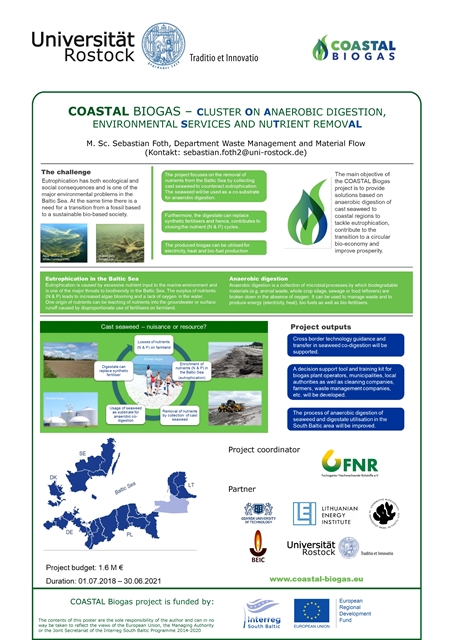
The poster was presented at the event “Landwirtschaft & Gewässerschutz – Optionen am Übergang von Fluss und Land” (Agriculture & Water Protection – options at the transition of river and land) on the 28th of November at the Town Hall of Greifswald, Germany. The event was organised by Grüne Liga e.V.
 Conference summary
Conference summary
The 1st COASTAL Biogas conference took place on the 8th of May 2019 in Malmö, Sweden. The conference summary gives an overview of the topics discussed including general observations and conclusions.
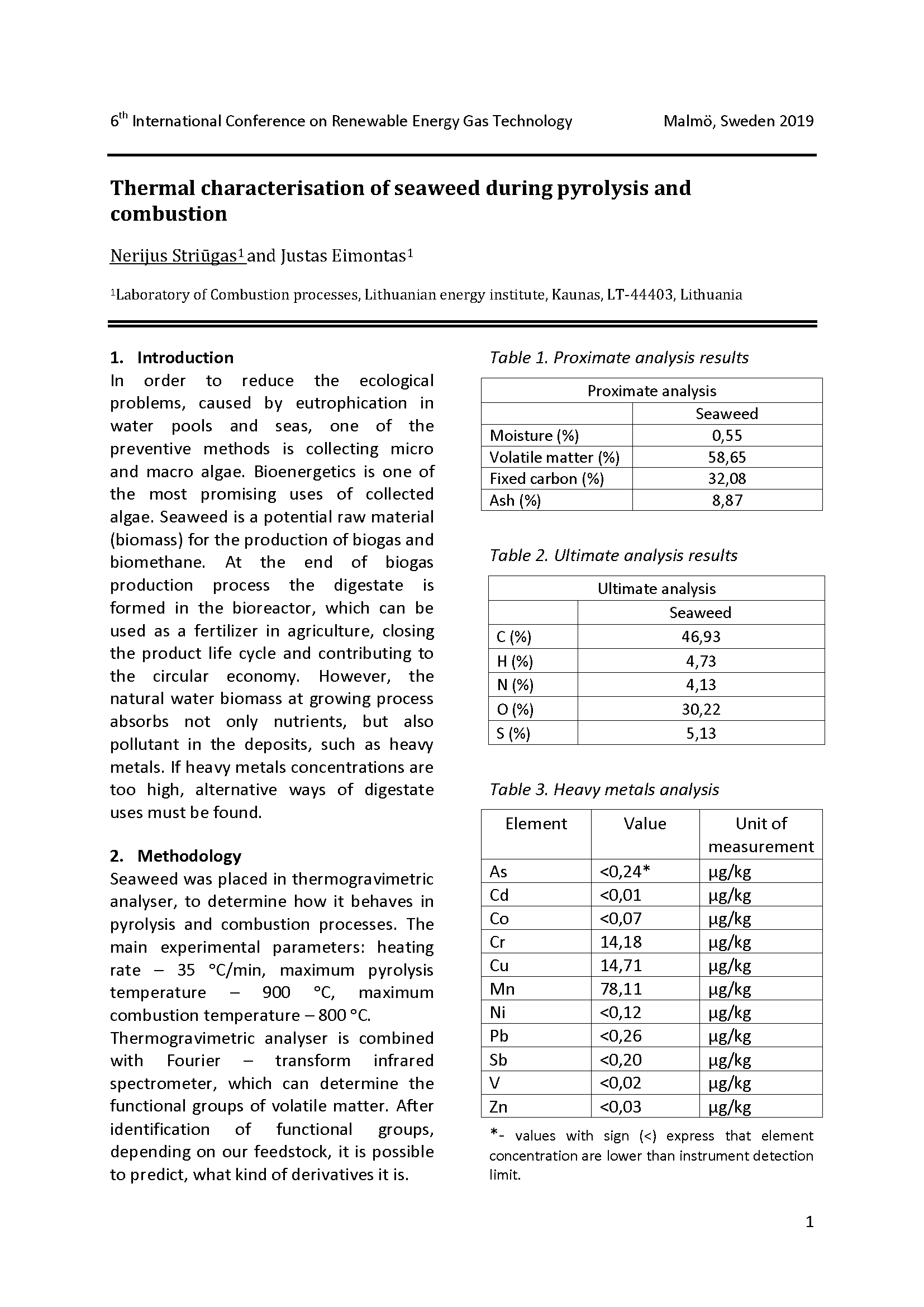 Thermal characterisation of seaweed during pyrolysis and combustion
Thermal characterisation of seaweed during pyrolysis and combustion
Extended abstract of the visual presentation presented at the 6th International Conference on Renewable Energy Technology, REGATEC 2019, by Nerijus Striugas and Justas Eimontas, Lithuanian Energy Institute. 20-21 May 2019, Malmö, Sweden.
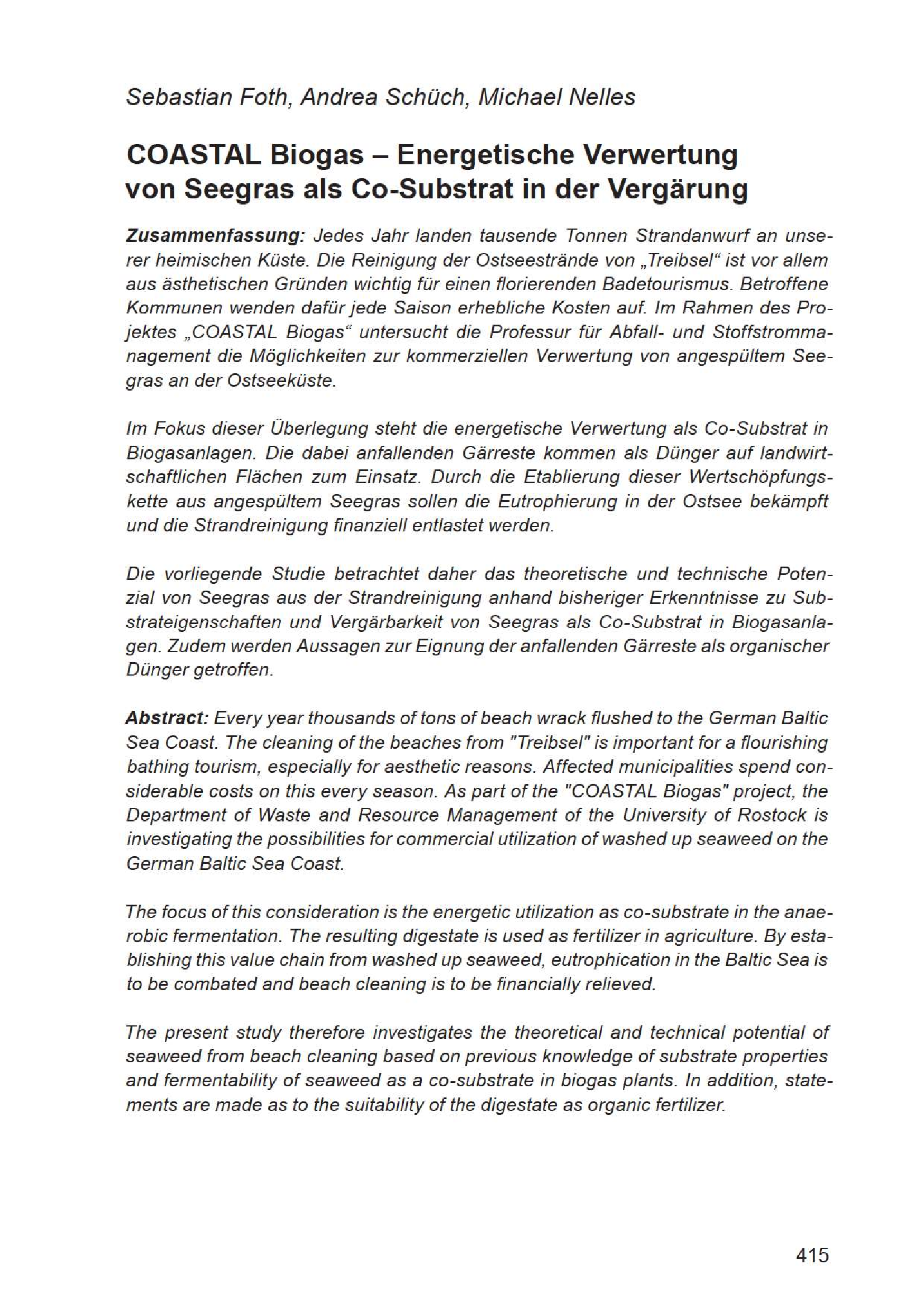 COASTAL Biogas – Energetische Verwertung von Seegras als Co-substrat in der Vergärung
COASTAL Biogas – Energetische Verwertung von Seegras als Co-substrat in der Vergärung
Article in German by Sebastian Foth, Andrea Schüch and Michael Nelles. Published in the conference proceedings of the 14th Rostocker Bioenergieforum, June 2020.
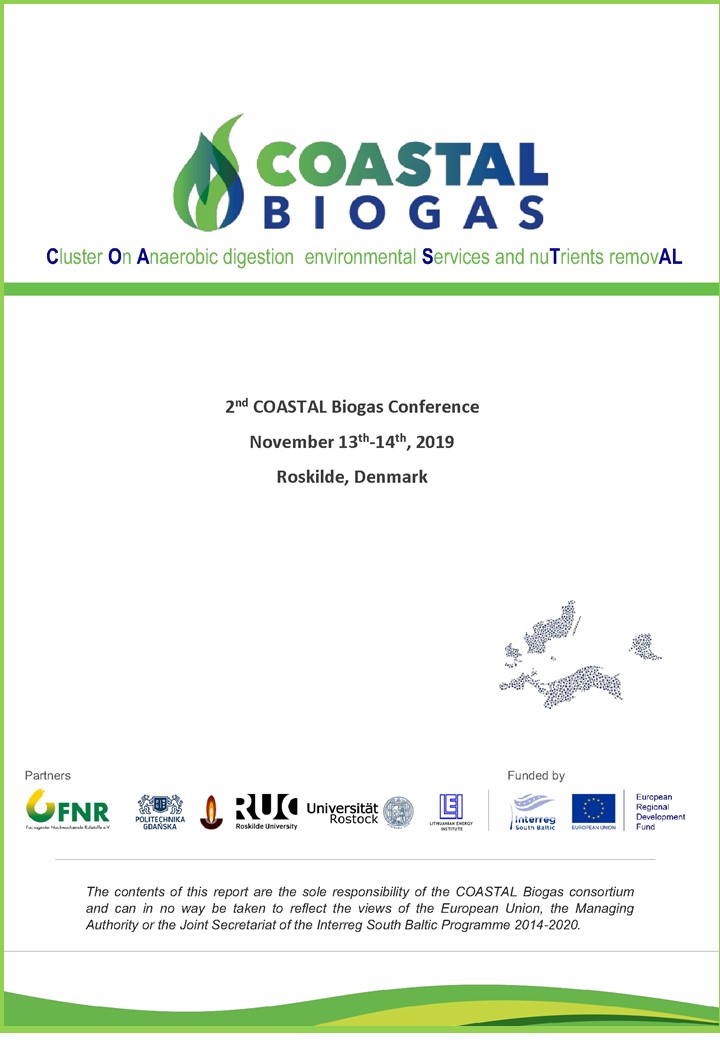 Conference summary
Conference summary
The 2nd COASTAL Biogas conference took place on the 13th of November 2019 in Roskilde, Denmark. The conference summary gives an overview of the topics discussed including general observations and conclusions.
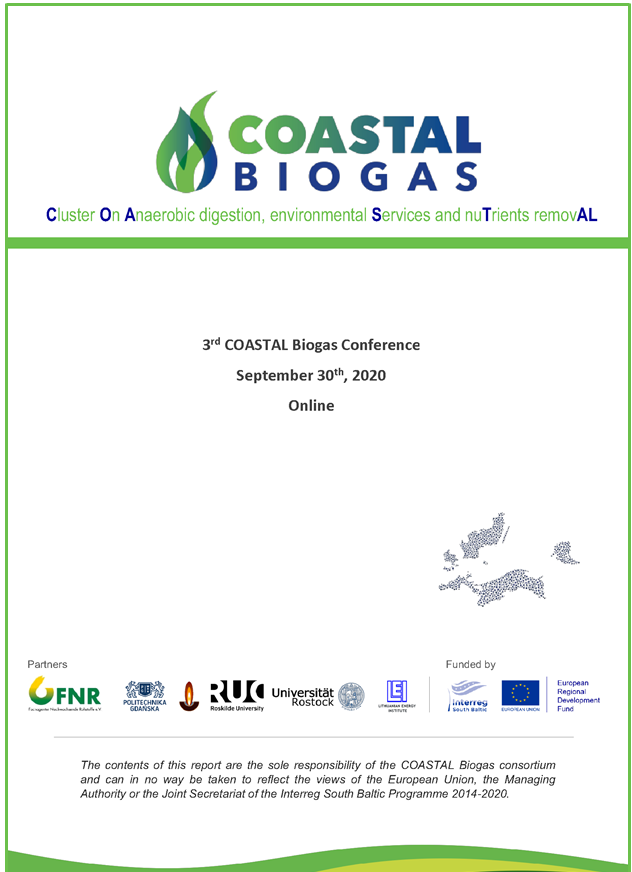 Conference summary
Conference summary
The 3rd COASTAL Biogas conference took place on the 30th of September 2020 as an online event. The conference summary gives an overview of the topics discussed including the main take aways.
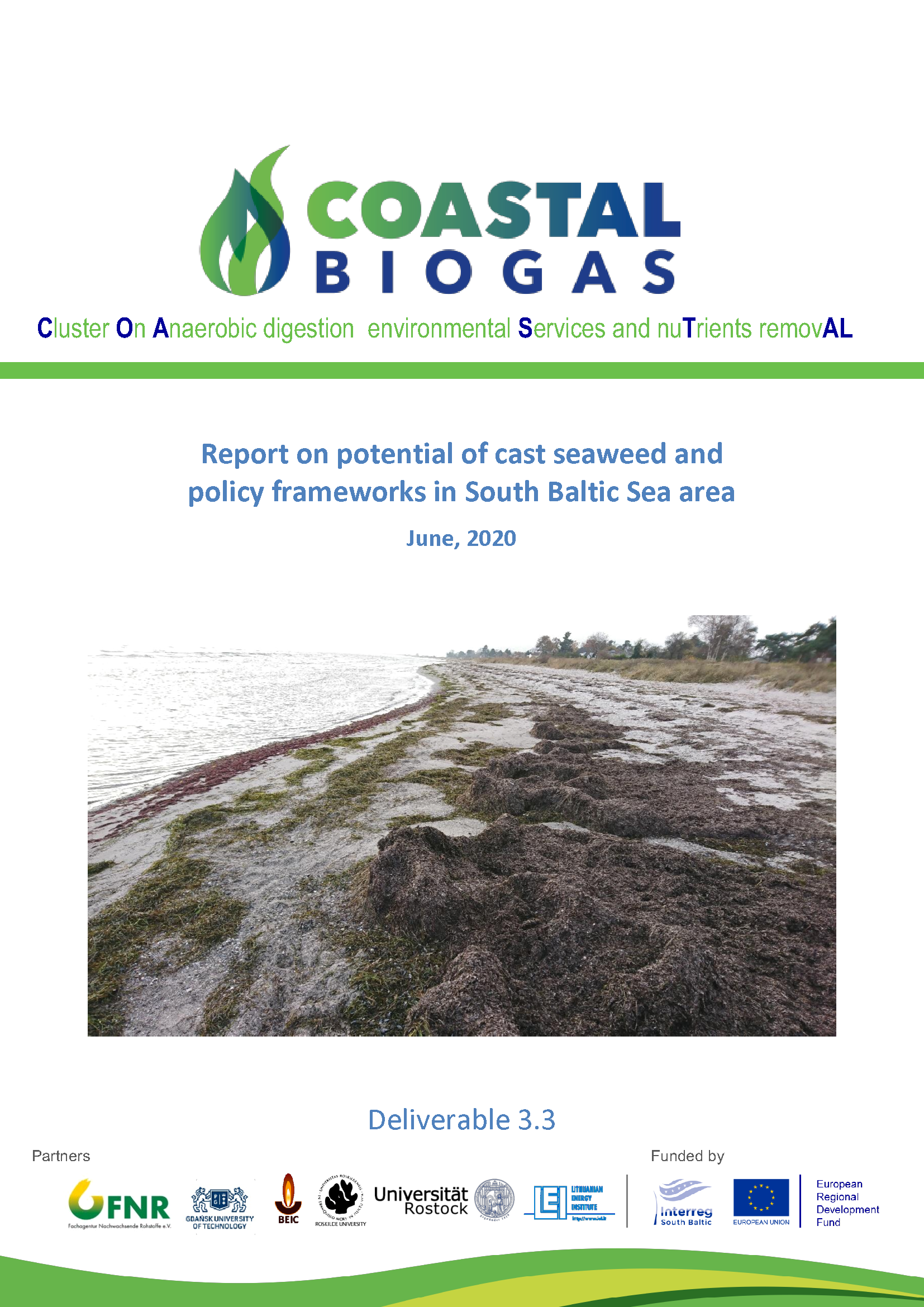 Deliverable 3.3. Report on potential of cast seaweed and policy frameworks.
Deliverable 3.3. Report on potential of cast seaweed and policy frameworks.
The report gives a quantitative potential of cast seaweed in the territory covered by the Interreg South Baltic Programme. The report covers policy frameworks related use of seaweed as a potential feedstock for green energy production and regulations on biogas plant establishment in DE, DK, LT, PL and SE.
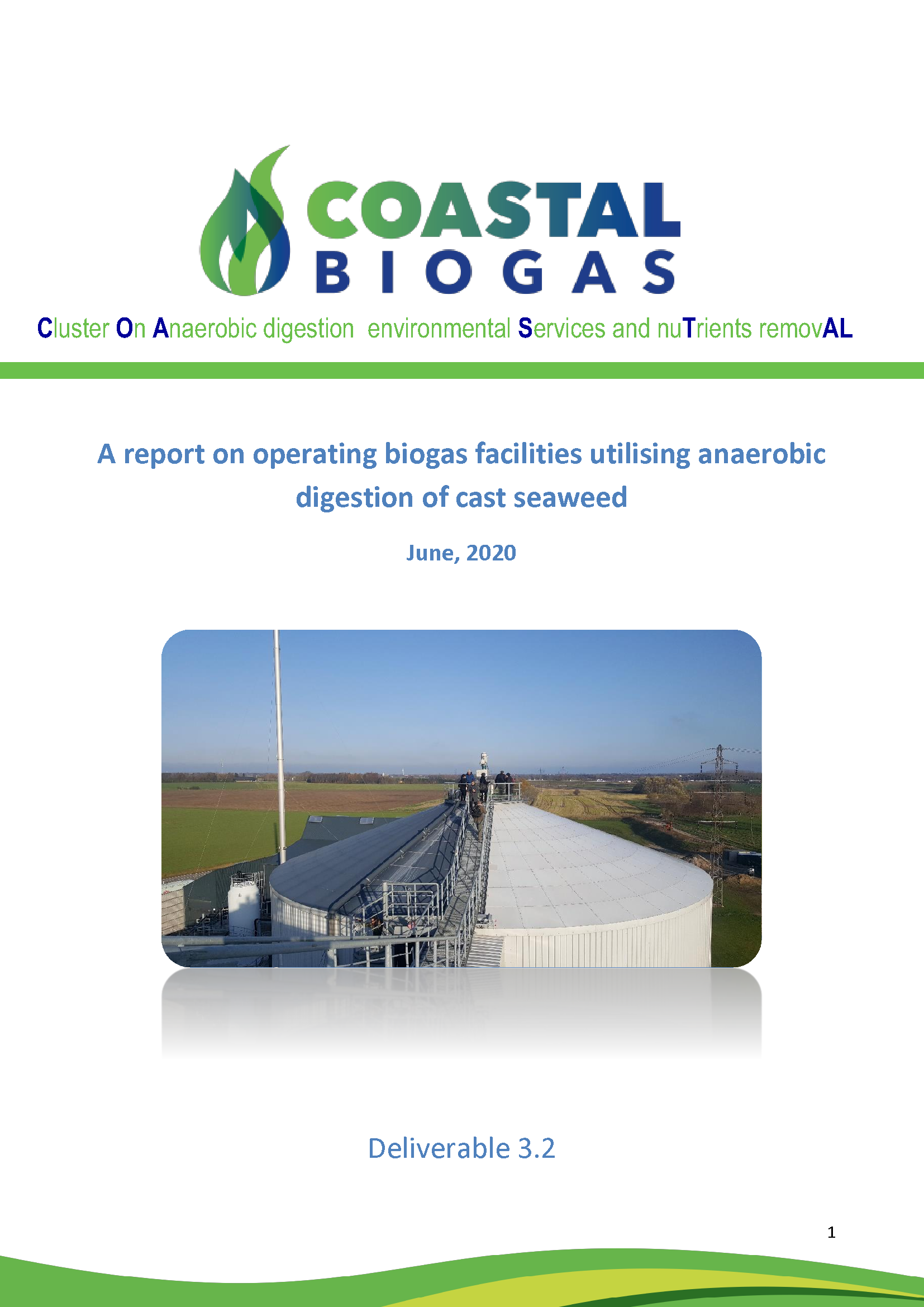 Deliverable 3.2. Report on operating biogas facilities utilising anaerobic digestion of cast seaweed.
Deliverable 3.2. Report on operating biogas facilities utilising anaerobic digestion of cast seaweed.
The report includes the whole aquatic biomass handling chain, from substrate collection, storage and pre-treatment to biogas production and digestate utilisation, of two separate biogas facilities in Denmark, Solrød Biogas, and Sweden, Smyge pilot plant.
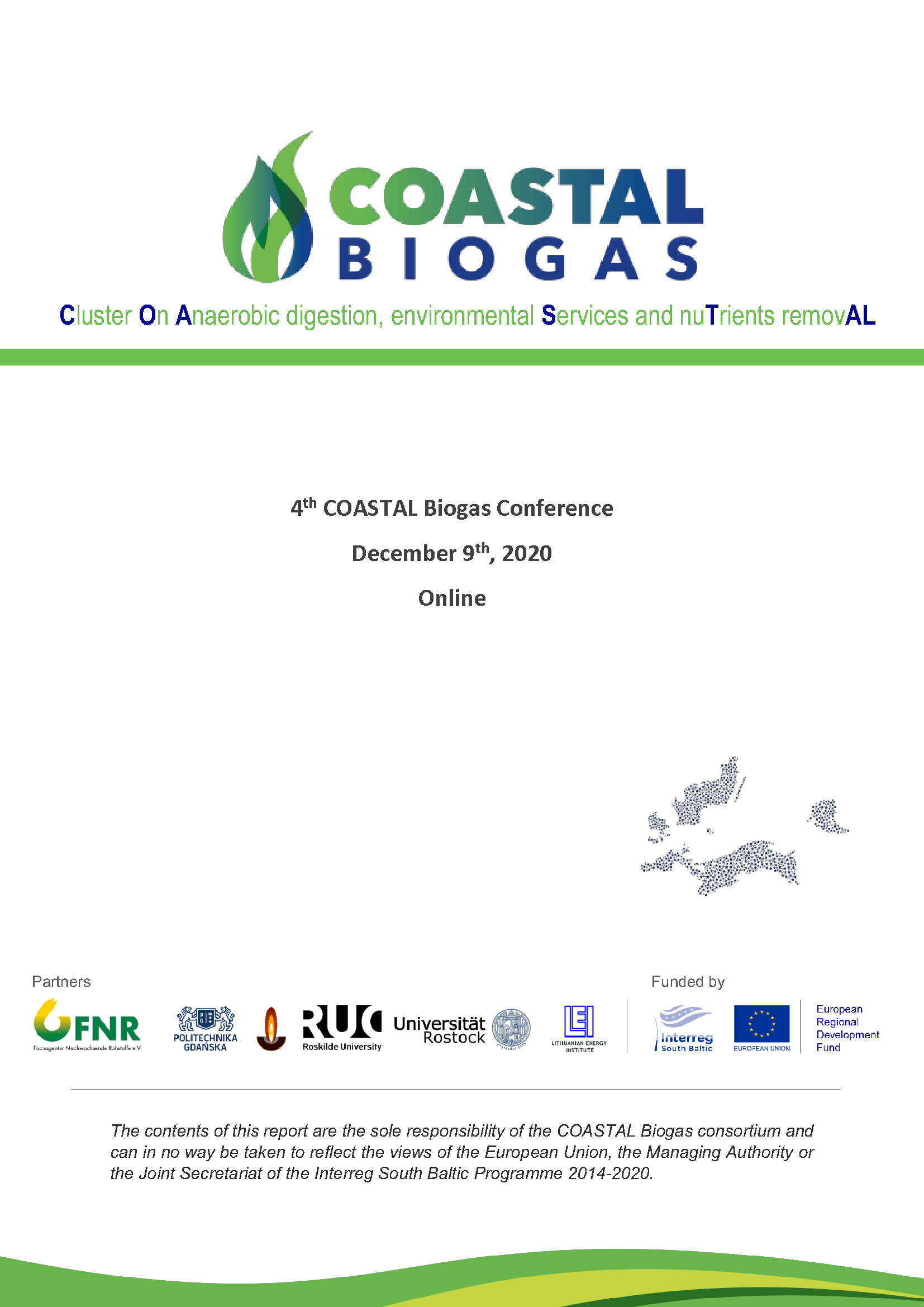 Conference summary
Conference summary
The 4th COASTAL Biogas conference took place on the 9th of December 2020 as an online event. The conference summary gives an overview of the topics discussed including the main take aways.
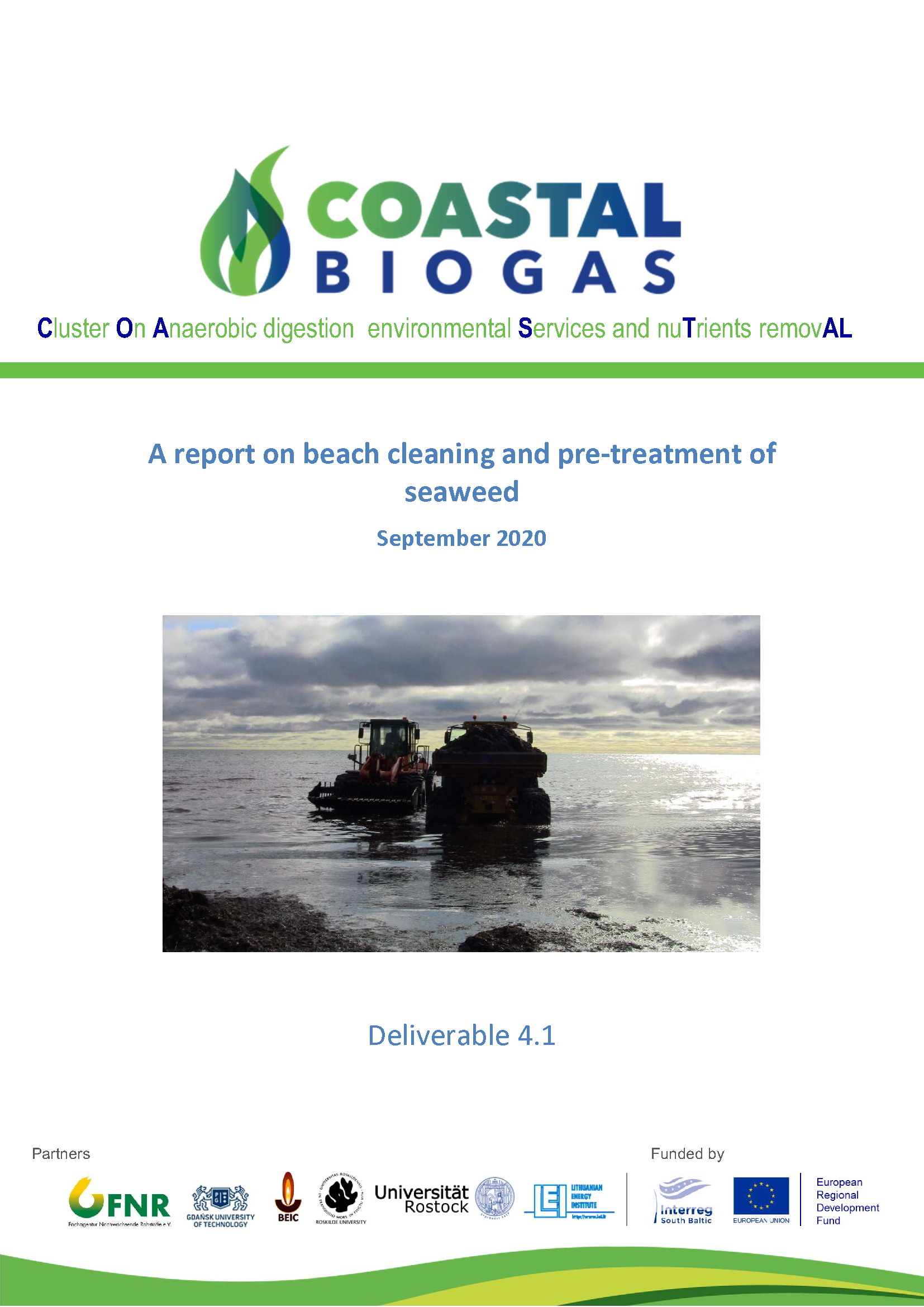 Deliverable 4.1. Report on beach cleaning and pretreatment of seaweed.
Deliverable 4.1. Report on beach cleaning and pretreatment of seaweed.
The intention of the study is to help to enable the collection of seaweed with a minimum of sand content and a minimal impact on the coastal nature of the South Baltic Area. In addition, treatment of seaweed for biogas digestion, including storage options, pre-treatment methods and optimal biomethane potentials are included.
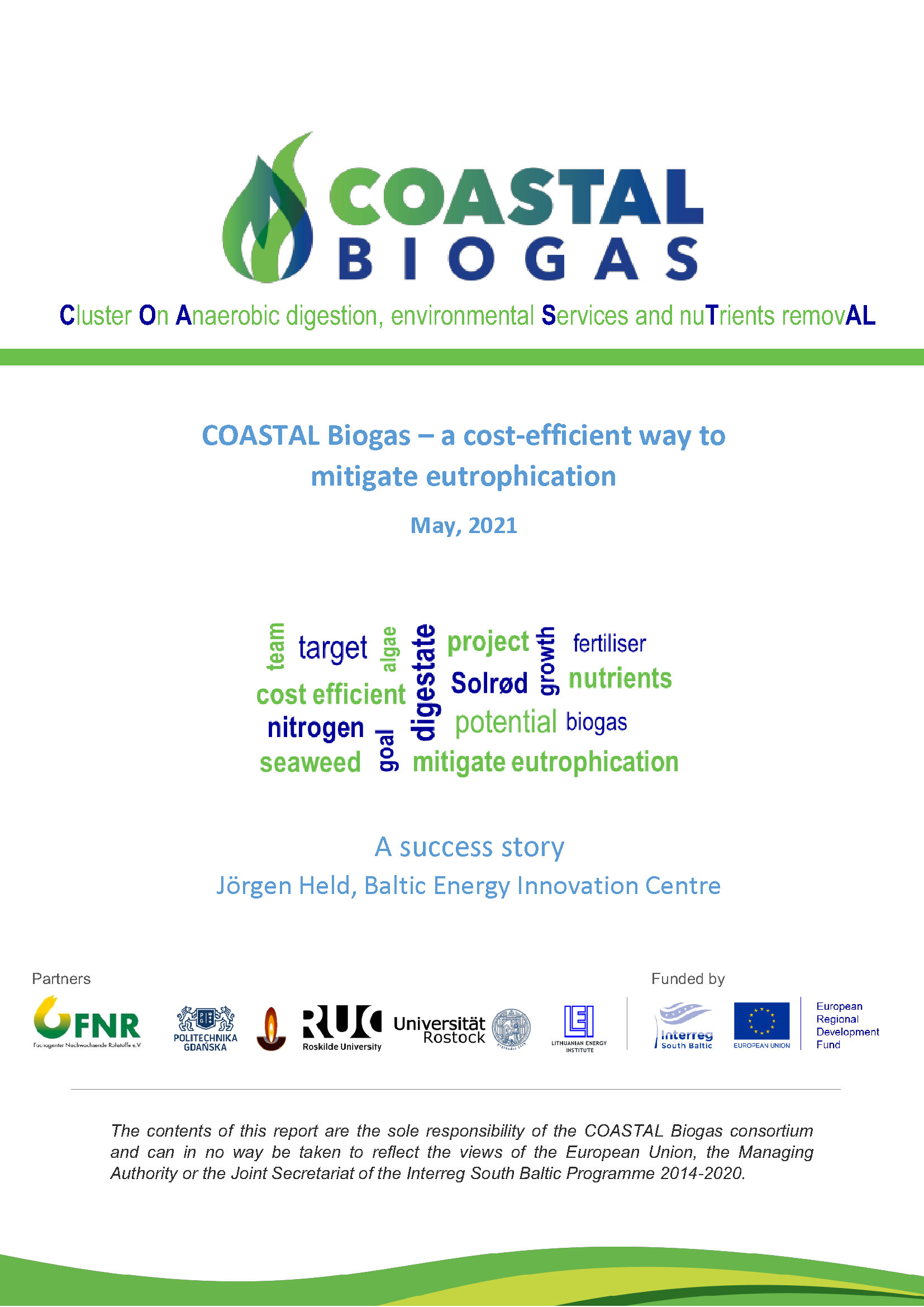 COASTAL Biogas – a cost-efficient way to mitigate eutrophication.
COASTAL Biogas – a cost-efficient way to mitigate eutrophication.
In this study two measures to reduce the amount of nitrogen in the Køge Bay, Denmark have been investigated – direct reduction of fertiliser on farmland and the COASTAL Biogas concept. The main conclusion is that the COASTAL Biogas concept is a cost-efficient way to mitigate eutrophication.
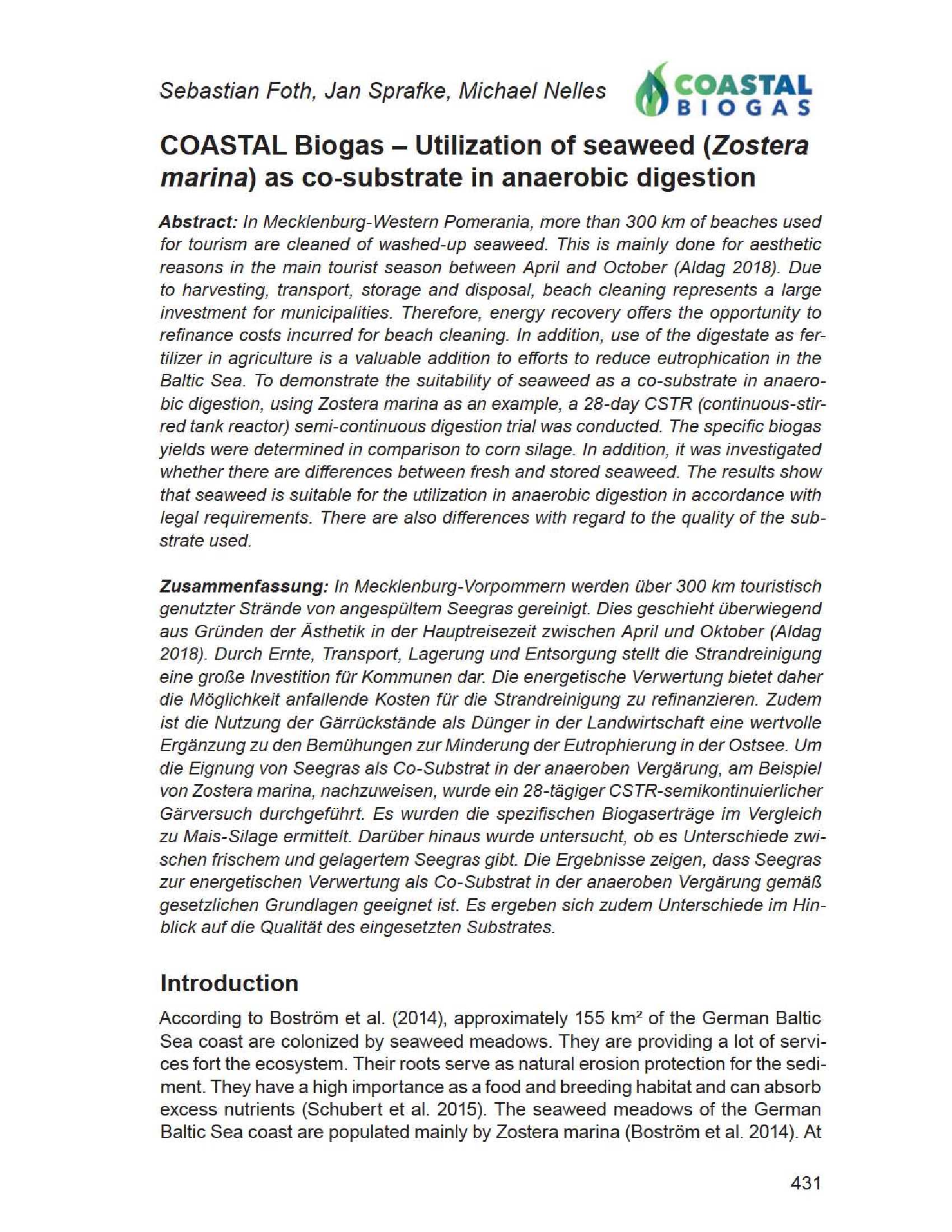 COASTAL Biogas – Utilization of seaweed (Zostera marina) as co-substrate in anaerobic digestion
COASTAL Biogas – Utilization of seaweed (Zostera marina) as co-substrate in anaerobic digestion
Article by Sebastian Foth, Jan Sprafke and Michael Nelles. Published in the conference proceedings of the 15th Rostocker Bioenergieforum, June 2021.
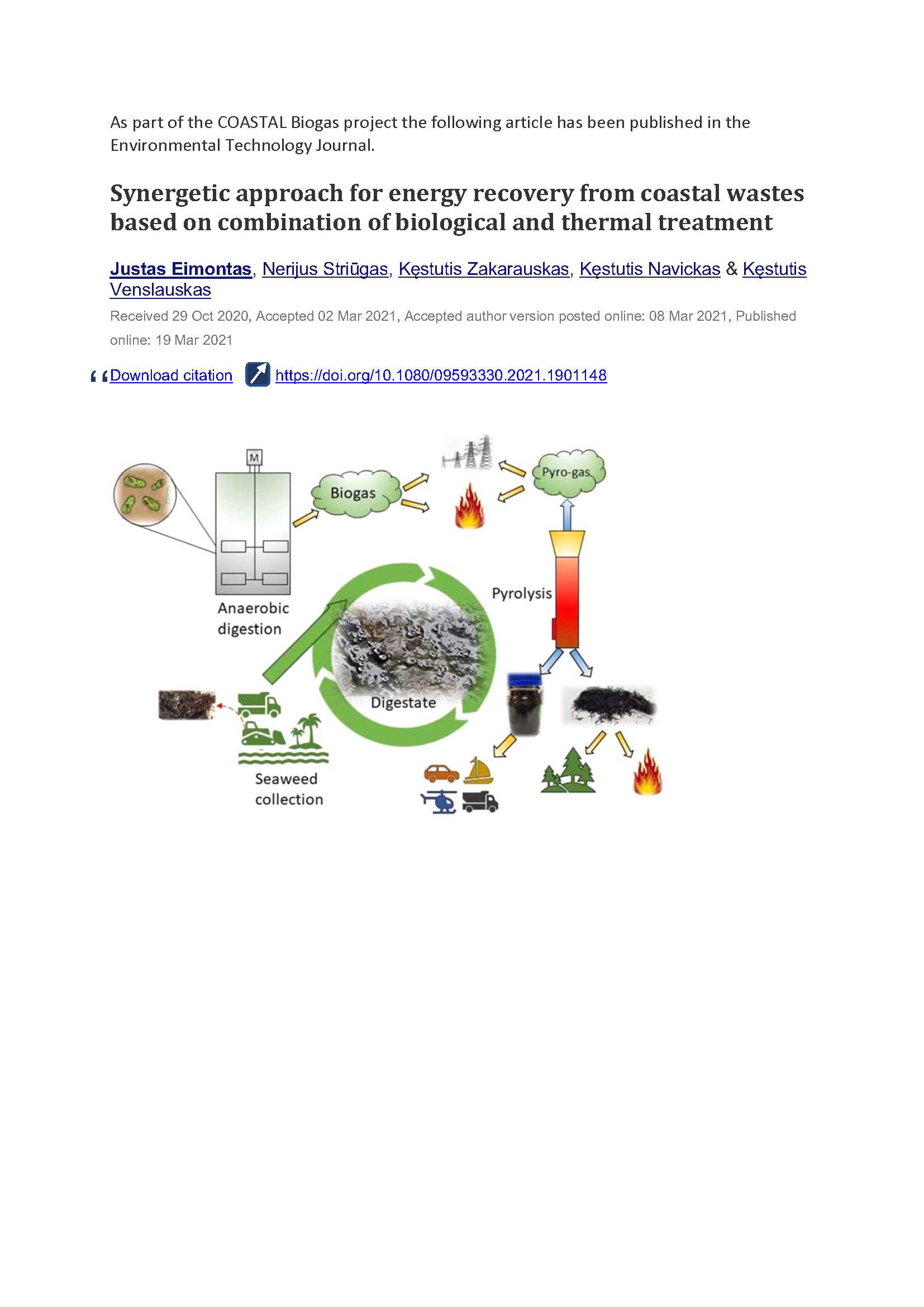 Synergetic approach for energy recovery from coastal wastes based on combination of biological and thermal treatment
Synergetic approach for energy recovery from coastal wastes based on combination of biological and thermal treatment
Journal paper by Justas Eimontas, Nerijus Striūgas, Kęstutis Zakarauskas, Kęstutis Navickas & Kęstutis Venslauskas. Environmental Technology, 19 March 2021. DOI: 10.1080/09593330.2021.1901148
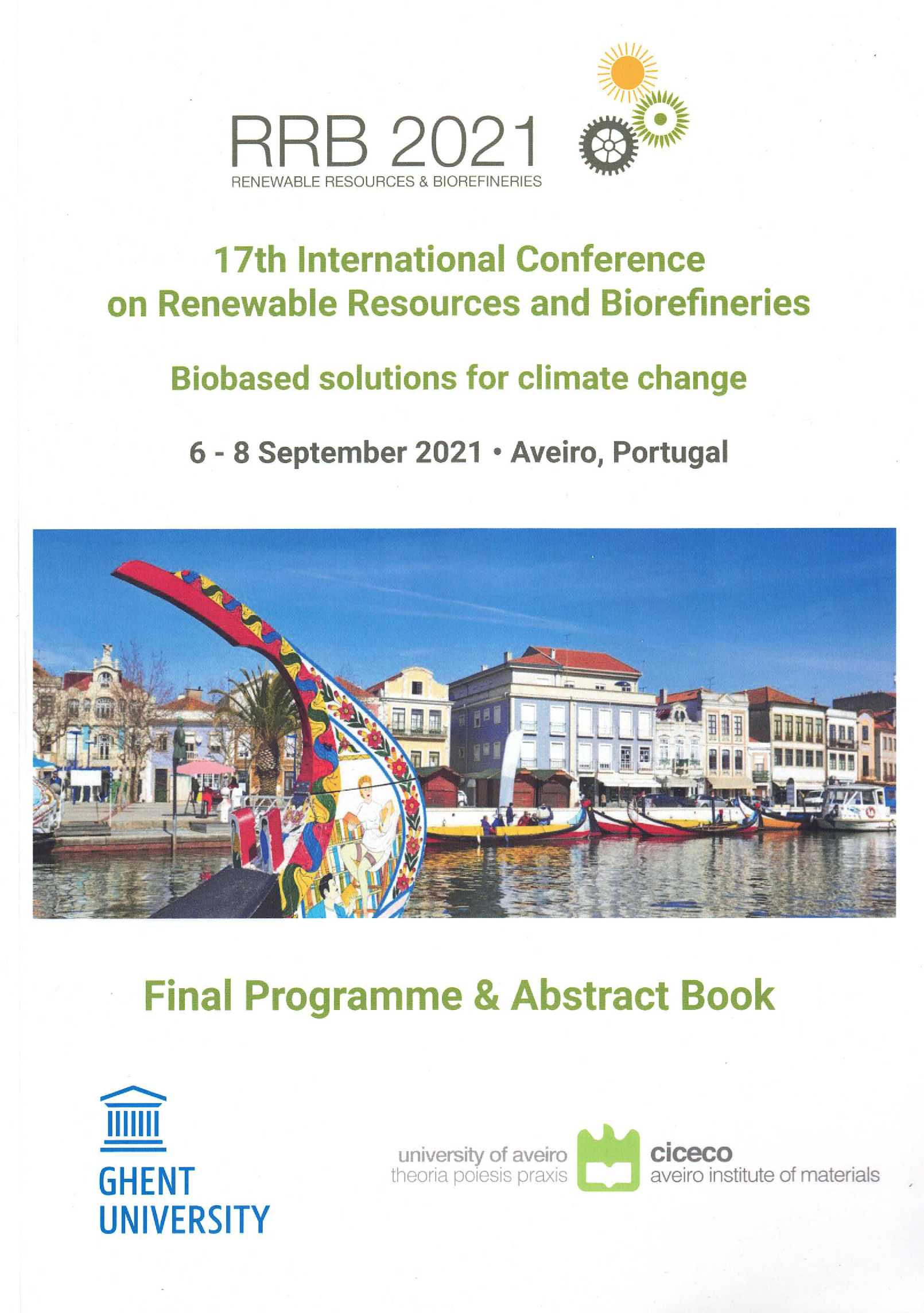 Seaweed potential for anaerobic digestion and Influence of seaweed pre-treatment on anaerobic digestion. Two poster contributions by Iwona Cichowska-Kopczynska and Robert Aranowski, Gdansk University of Technology at the 17th International Conference on Renewable Resources and Biorefineries, Aveiro, Portugal 6-8 September 2021.
Seaweed potential for anaerobic digestion and Influence of seaweed pre-treatment on anaerobic digestion. Two poster contributions by Iwona Cichowska-Kopczynska and Robert Aranowski, Gdansk University of Technology at the 17th International Conference on Renewable Resources and Biorefineries, Aveiro, Portugal 6-8 September 2021.
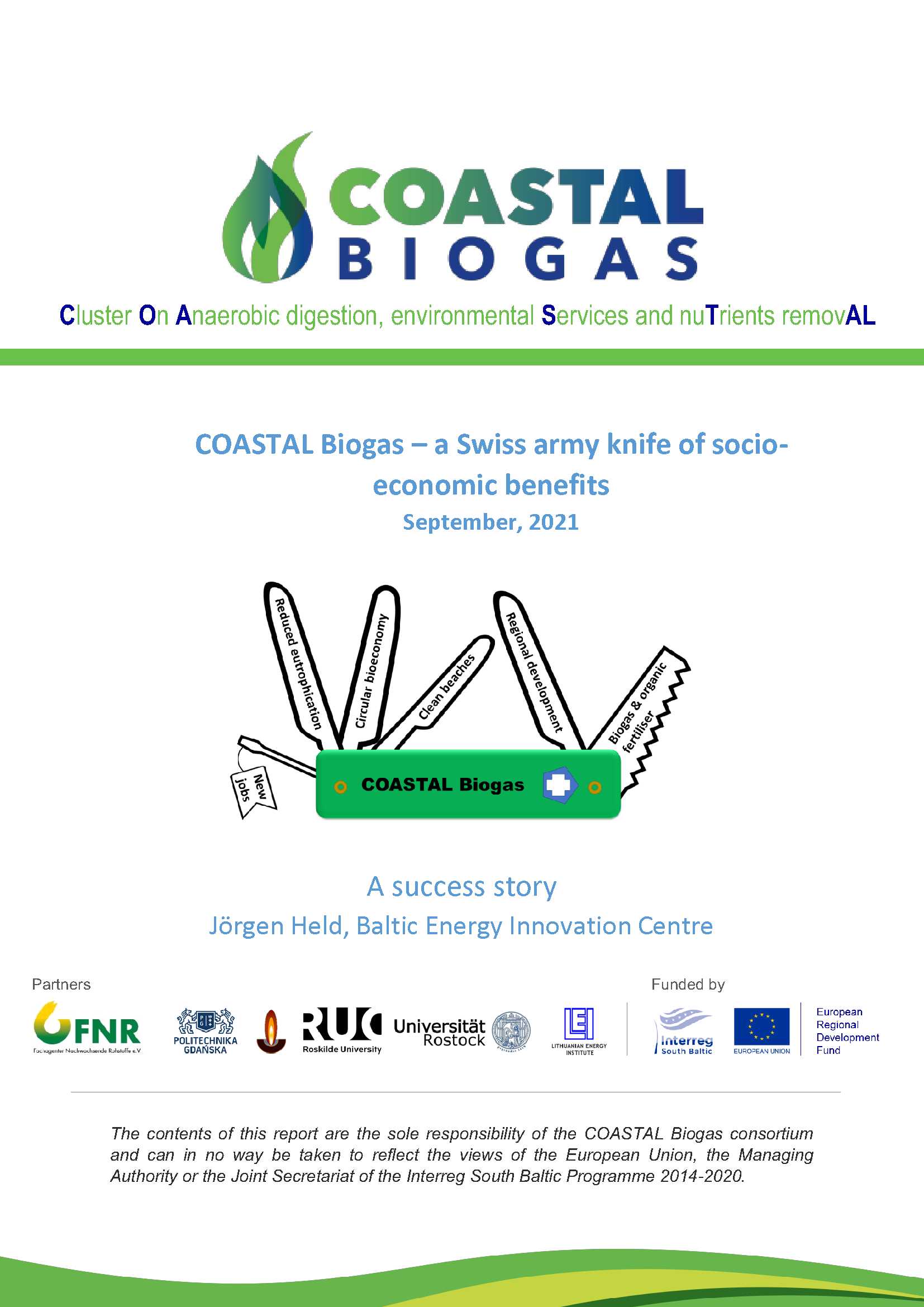 COASTAL Biogas – a Swiss army knife of socio-economic benefits.
COASTAL Biogas – a Swiss army knife of socio-economic benefits.
In this study, the main socio-economic benefits of the COASTAL Biogas concept are highlighted.
The concept is implemented in Solrød, Denmark as part of the municipality´s climate action plan.
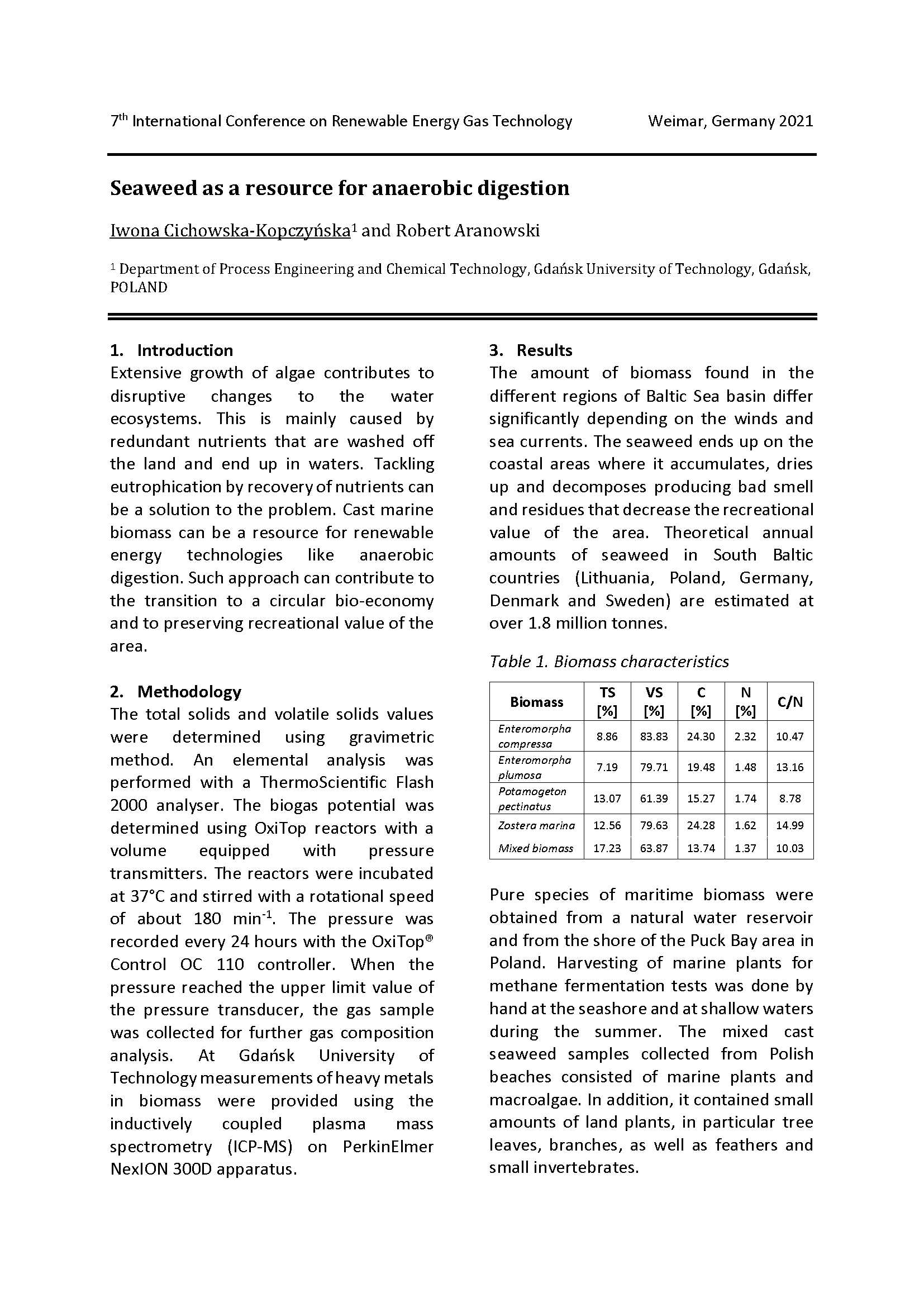 Seaweed as a resource for anaerobic digestion
Seaweed as a resource for anaerobic digestion
Extended abstract of the visual presentation presented at the 7th International Conference on Renewable Energy Technology, REGATEC 2020, by Iwona Cichowska-Kopczyńska and Robert Aranowski, Gdansk University of Technology. 20-21 September 2021, Weimar, Germany.
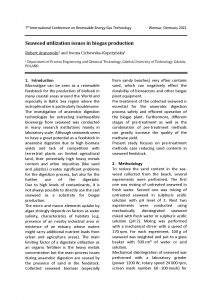 Seaweed utilization issues in biogas production
Seaweed utilization issues in biogas production
Extended abstract of the visual presentation presented at the 7th International Conference on Renewable Energy Technology, REGATEC 2020, by Robert Aranowski and Iwona Cichowska-Kopczyńska, Gdansk University of Technology. 20-21 September 2021, Weimar, Germany.
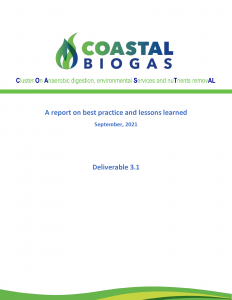 Deliverable 3.1. Report on best practise and lessons learned
Deliverable 3.1. Report on best practise and lessons learned
The report includes experiences and good practise of ongoing and finished projects dealing with aquatic biomass. The review contributes to COASTAL Biogas’ aim of finding strategies to mitigate eutrophication and its negative consequences.
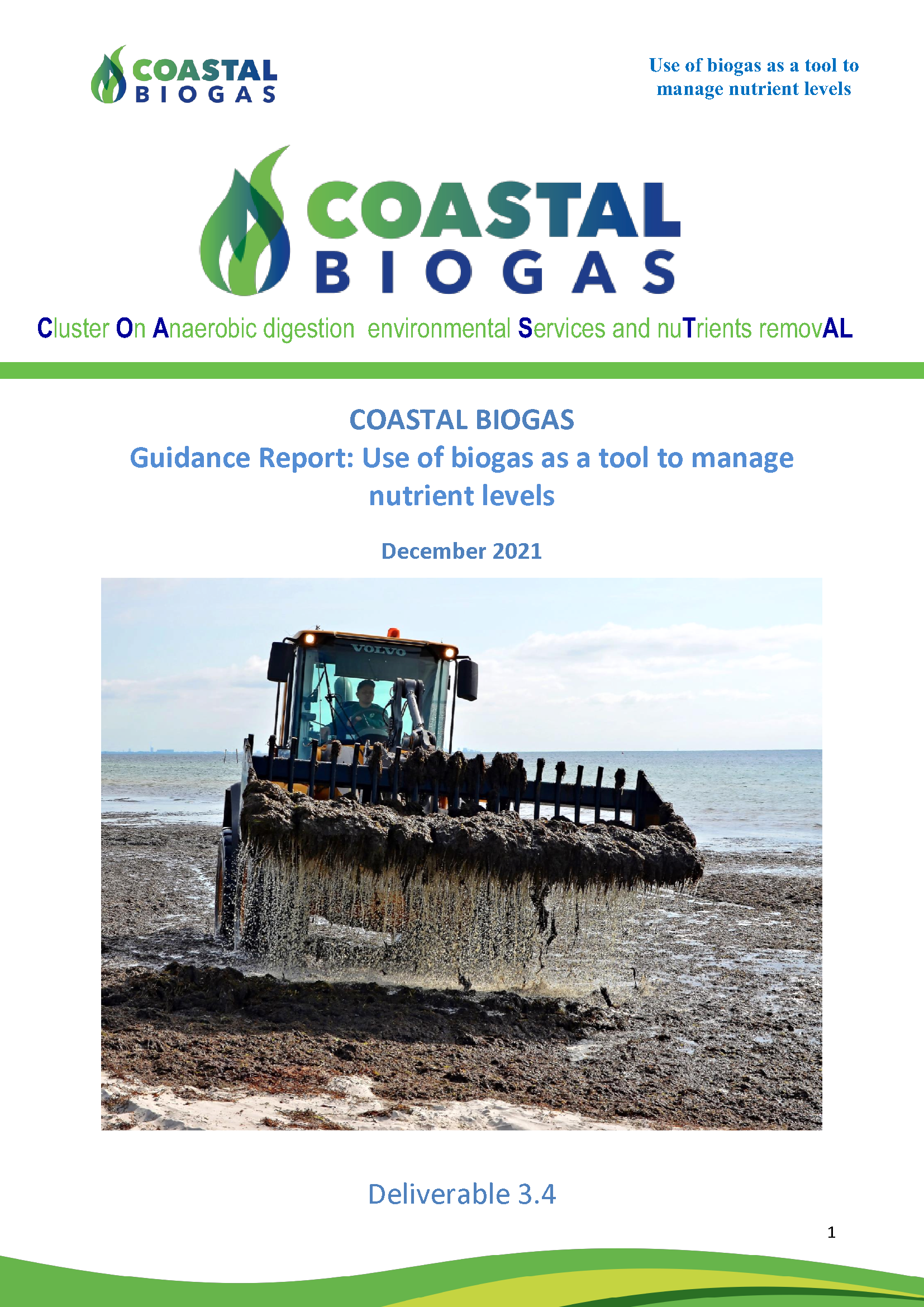 Deliverable 3.4. Guidance report on the use of biogas a a tool to manage nutrient levels
Deliverable 3.4. Guidance report on the use of biogas a a tool to manage nutrient levels
The report presents a tool that can be used to mitigate eutrophication in the Baltic Sea. The tool comprises the collection and utilisation of cast seaweed as a substrate for biogas plants and utilising the digestate as a fertiliser.
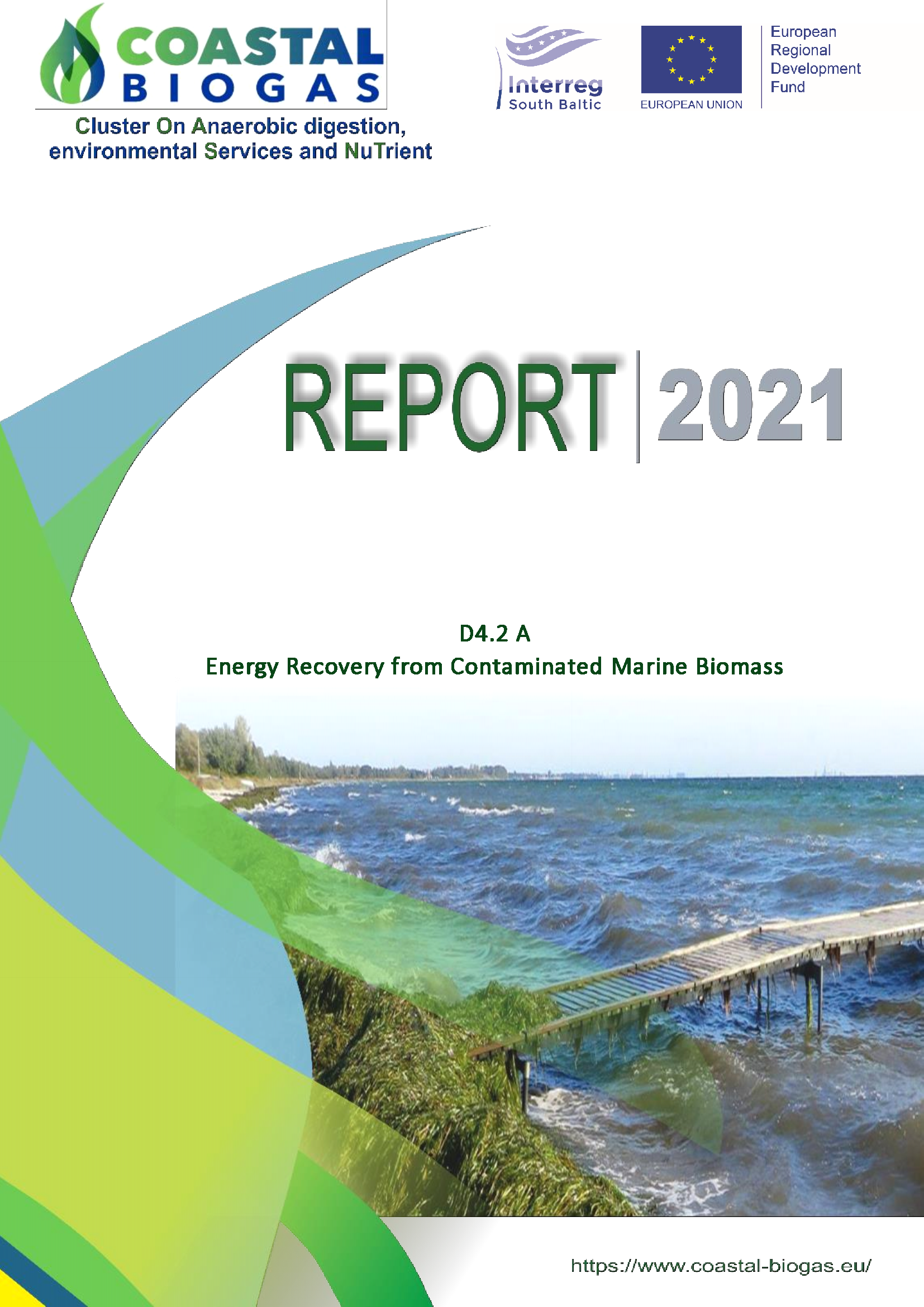 Deliverable 4.2A Energy recovery from contaminated marine biomass
Deliverable 4.2A Energy recovery from contaminated marine biomass
The report presents the energy balance for three different conversion pathways for contaminated seaweed; Direct pyrolysis of the contaminated seaweed, Pyrolysis of the digestate and Plasma gasification. In each of the analysed cases, the total energy balance was positive, i.e. useful energy can be generated from the processed biomass.
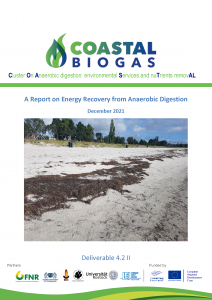 Deliverable 4.2B Energy recovery from anaerobic digestion
Deliverable 4.2B Energy recovery from anaerobic digestion
The report focuses on the energy recovery from anaerobic digestion when adding seaweed to the biogas production. The study explores the circular process of nutrients, which are recovered when the cast seaweed is collected and the digestate is used as fertiliser on farmland. The report has a special focus on investigating and documenting the energy recovery potential from anaerobic
digestion.
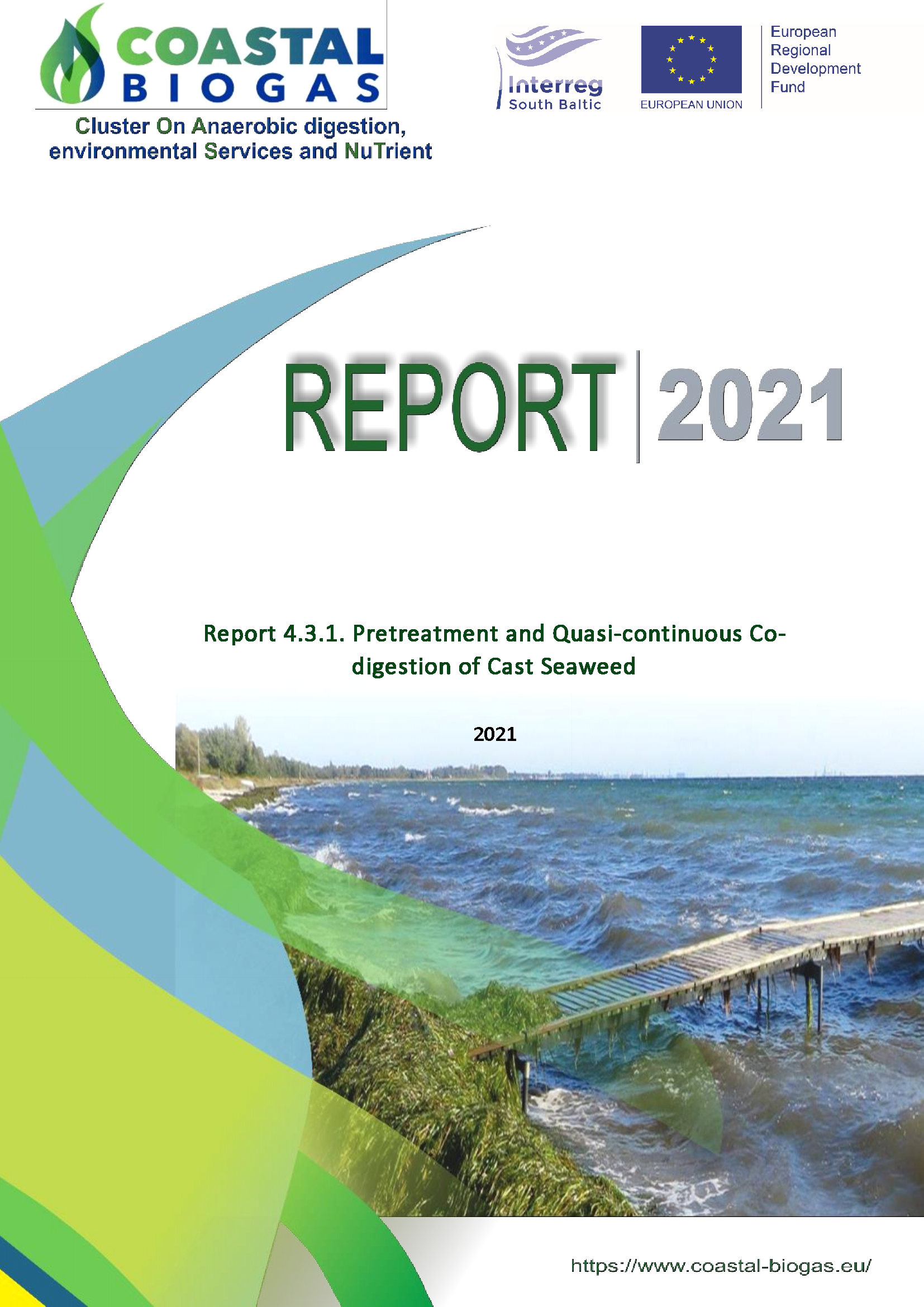 Deliverable 4.3A Pretreatment and quasi-continuous digestion of cast seaweed
Deliverable 4.3A Pretreatment and quasi-continuous digestion of cast seaweed
The key parameter for the evaluation of substrates to be used in anaerobic digestion plants and pretreatment methods is the biogas potential. For this purpose, measurements of quasi-continuous digestion of marine biomass were carried out in reactors with a total capacity of 1 dm3 and 1,000 dm3. The results of the experiments are presented in this report.
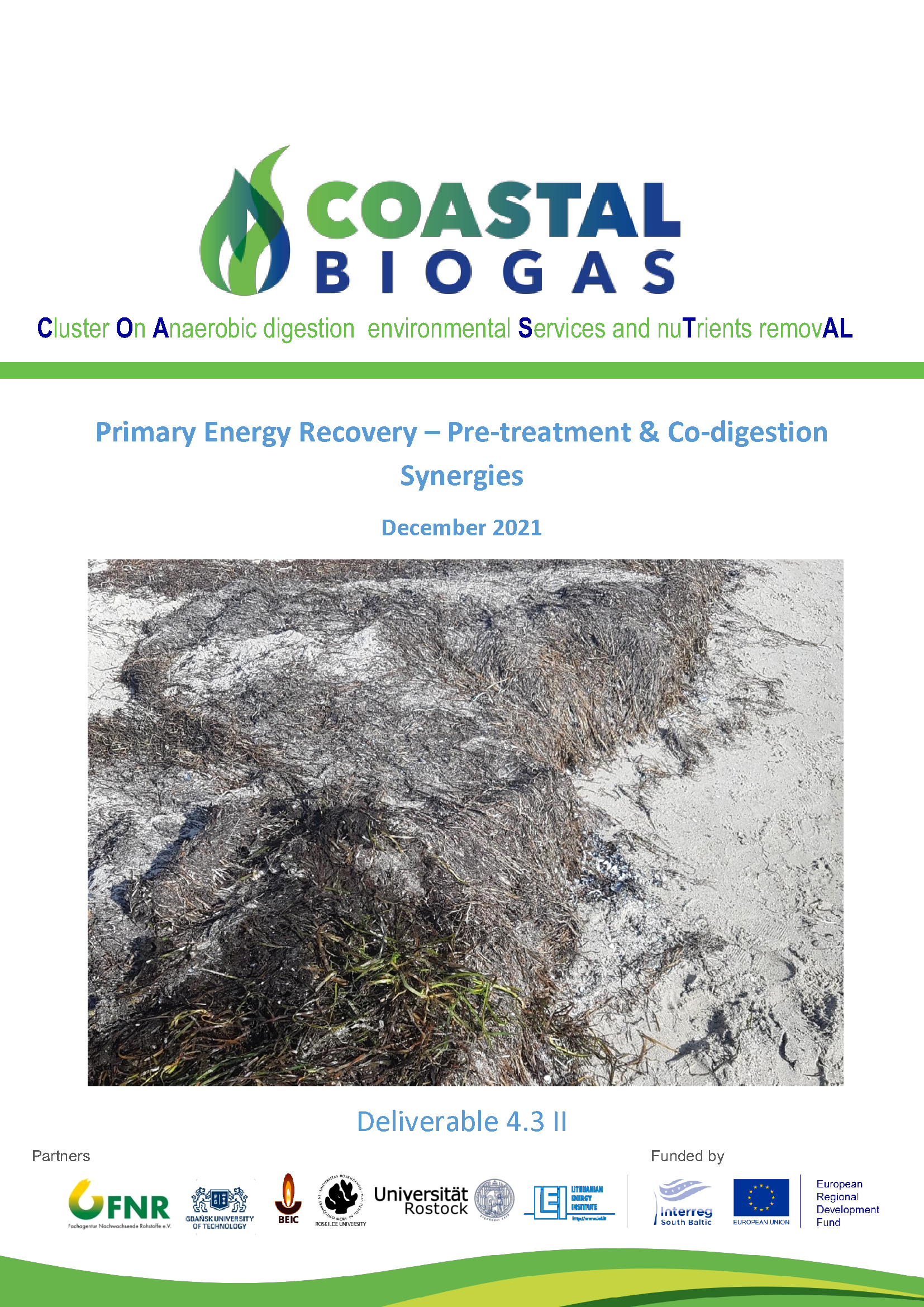 Deliverable 4.3B Primary energy recovery pre-treatment and co-digestion synergies
Deliverable 4.3B Primary energy recovery pre-treatment and co-digestion synergies
The purpose of this report is to provide an overview of the different collection techniques and their costs as well as the effects on pre-treatment methods performed when separating sand from cast seaweed. Furthermore, the report includes how to use the nutrients in an optimal way and the problems with the seasonal changes in the organic content of seaweed when focusing on heavy metals.
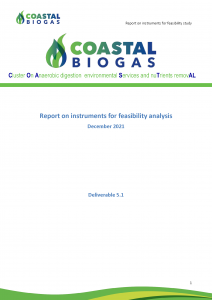 Deliverable 5.1 Report on instruments for feasibility analysis
Deliverable 5.1 Report on instruments for feasibility analysis
The tool described within this report is intended to give an overview on the estimation wether, at specific conditions, it is feasible to use cast seaweed for nutrients recycling and biogas production.
The tool is available online at
http://technologia.gda.pl/coastal
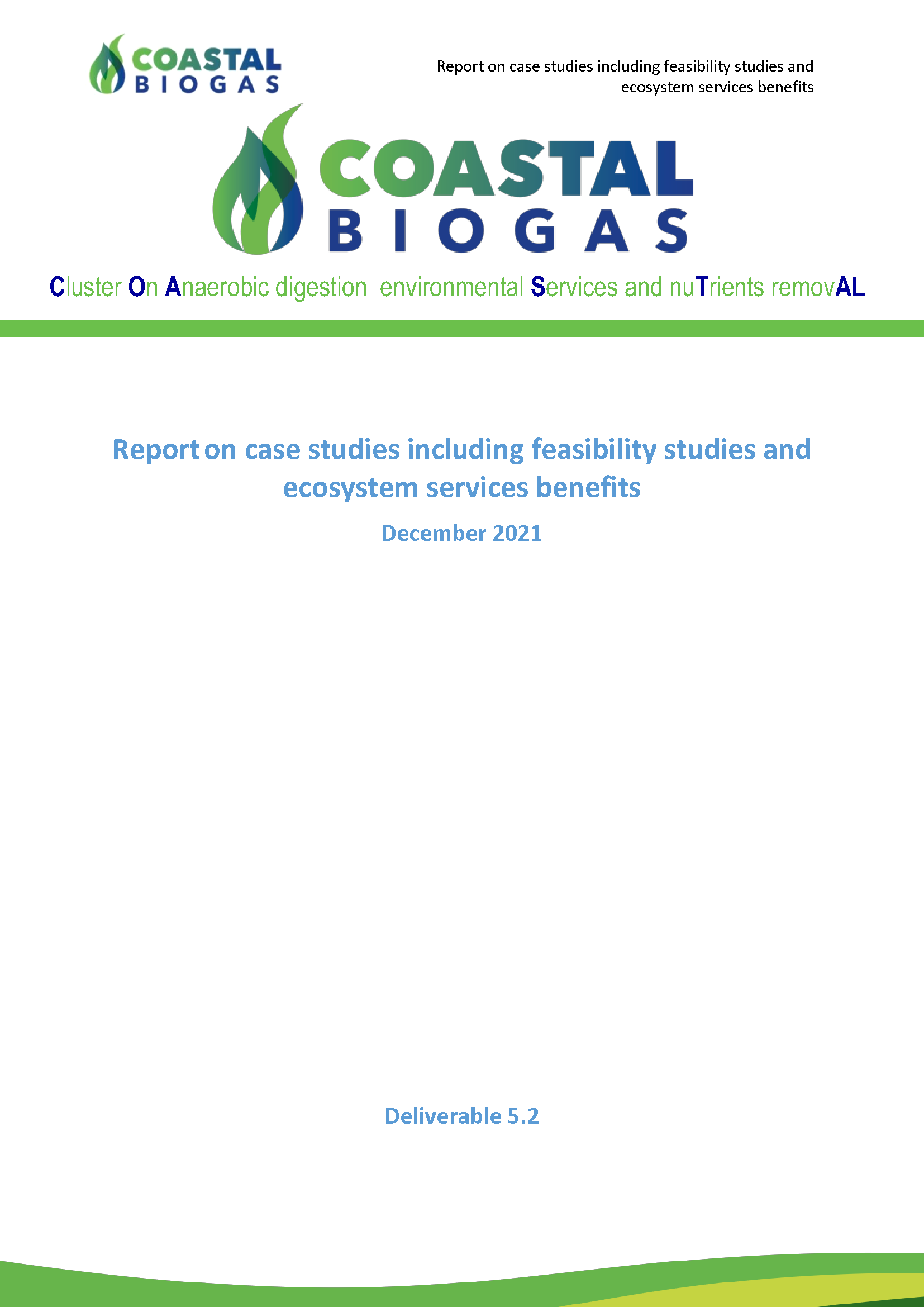 Deliverable 5.2 Report on case studies including feasibility studies and ecosystem services benefits
Deliverable 5.2 Report on case studies including feasibility studies and ecosystem services benefits
Feasibility studies of selected cases on existing and new biogas plants in the partner countries (DE, DK, LT, PL and SE) and the possible use of cast seaweed, including collection, pre-treatment, in commercial biogas plans are presented within the report.
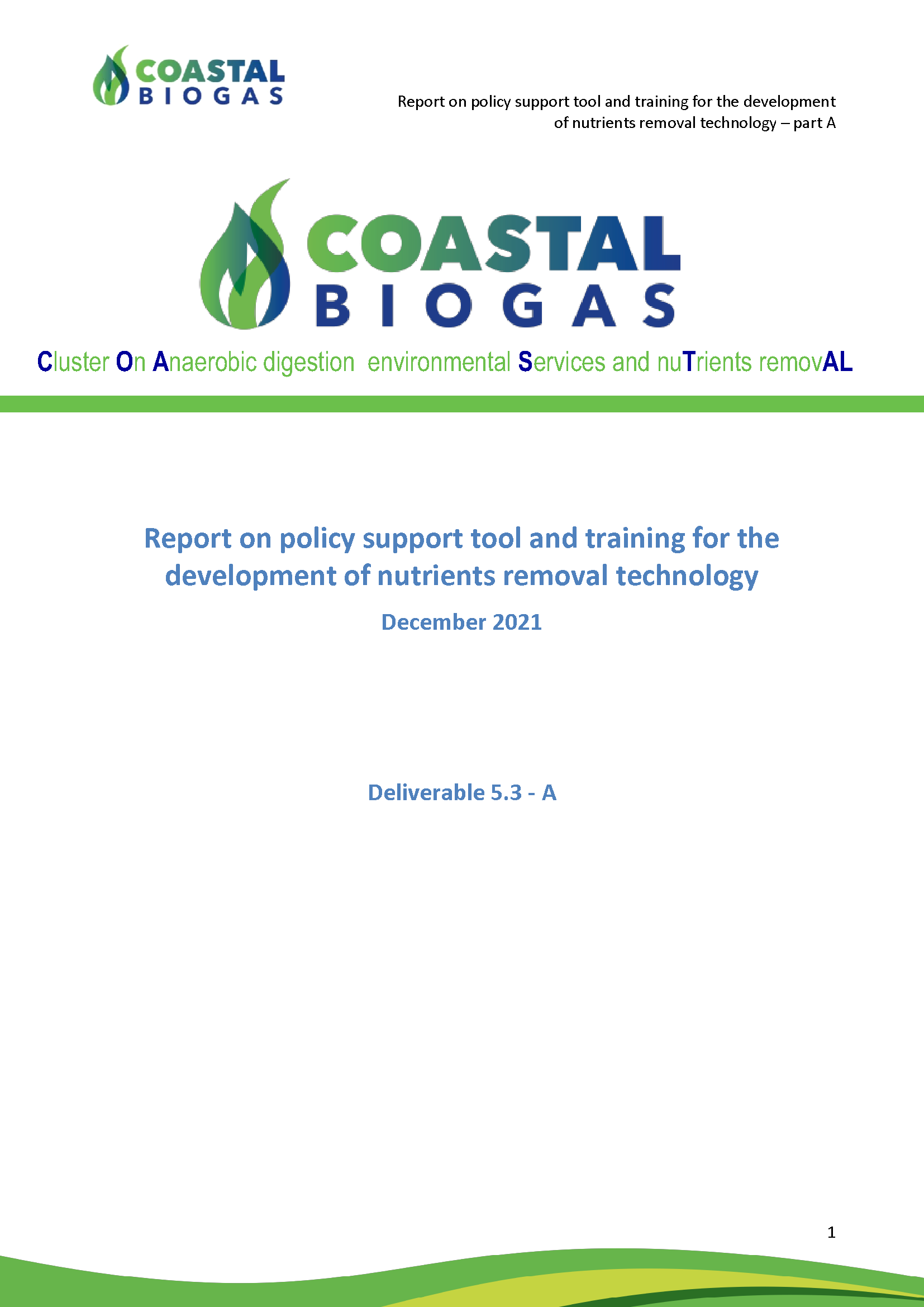 Deliverable 5.3A Report on policy support tool and training for the development of nutrients removal technology
Deliverable 5.3A Report on policy support tool and training for the development of nutrients removal technology
Part A: The analysis of the legislation in terms of algae collection from beaches, their transformation into biogas, the use of digestate, and the injection of biogas into the grid are presented. In addition, based on the collected data, practical solutions are suggested in order to fully utilise the potential of algae.
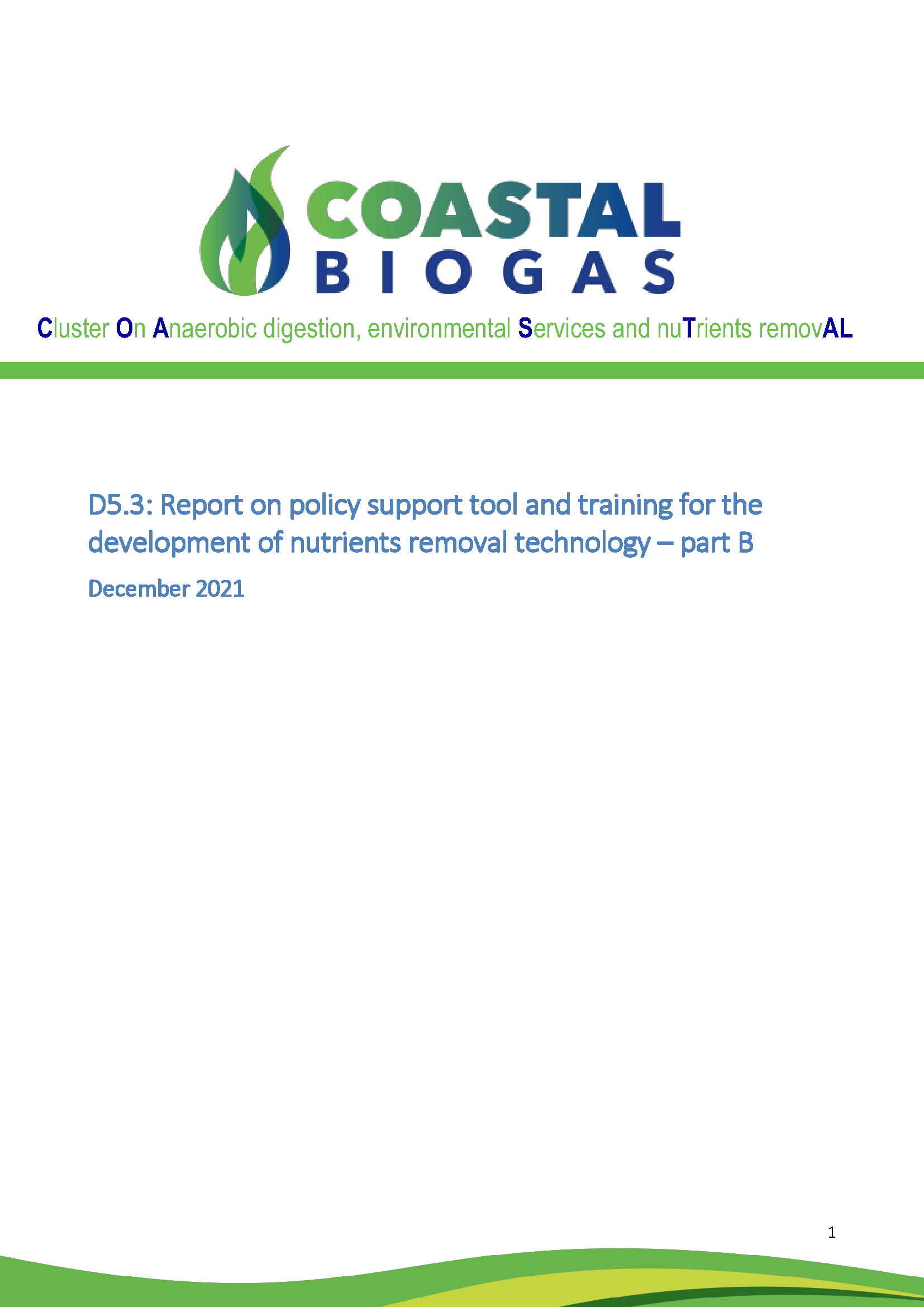 Deliverable 5.3B Report on policy support tool and training for the development of nutrients removal technology
Deliverable 5.3B Report on policy support tool and training for the development of nutrients removal technology
Part B: Within the framework of the COASTAL Biogas project the collected information – from laboratory findings
and practical experience – was offered to stakeholders in the form of workshops, as well as contacts and sources for further information. The training workshops were targeted at municipalities, waste management companies and biogas plant operators. Workshops were set up and organised for each partner country, in order to adapt the content and present the most relevant information for the respective target group.
The structure of the training material is based on the following media:
– A trainer website with publicly available informative texts, images and videos for general reference.
– An online presentation, which will be shared privately with the participants and can share further sources that the partners are not allowed to share publicly.
– Fact sheets as an overview of the most important information, if deemed relevant for the target group in the specific partner country.
The training material provided online is for the most part very general. The online information will be provided in the partner languages or English (depending on the fluency of the target group) and is intended to be supplemented and adapted by the regional partners in order to reflect the local situations.
